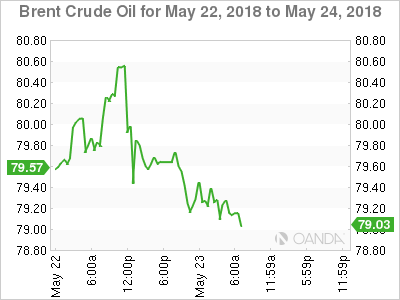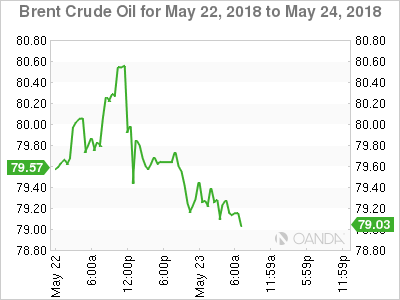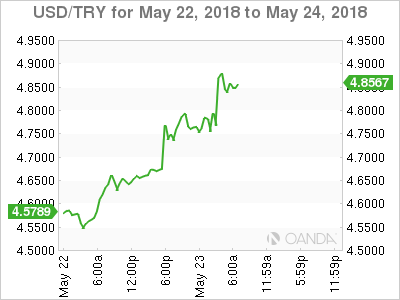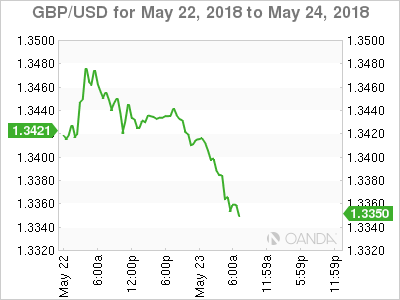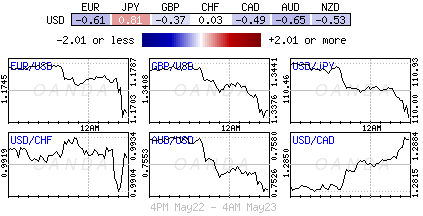Wednesday May 23: Five things the markets are talking about
Geopolitical risks from Turkey to N. Korea, from China to Italy, have pressured global equities in overnight trade. U.S Treasuries, along with the ‘mighty’ dollar have found support, while crude oil prices dropped along with most commodities.
Yesterday, U.S President Donald Trump tempered market optimism over progress made in trade talks between the U.S and China and his historic summit with N. Korea taking place.
Elsewhere, market concerns over Turkey’s financial-market stability has driven the TRY ($4.8792) to successive record lows outright and is weighing on emerging-market (EM) currencies, while safe-haven currencies, like the yen and CHF remain better bid.
Later today, the Federal Open Market Committee (FOMC) will release minutes of its May 1-2 policy meeting (02:00 pm EDT), while the ECB follows suit tomorrow (07:30 am EDT). Also this week, a plethora of U.S debt sales adds to the busy agenda.
1. Global stocks bleed red
In Japan, the Nikkei share average suffered its biggest fall in two months overnight, as Trump comments again ignited worries about trade friction, hurting steelmakers and shippers among others. The Nikkei tumbled -1.2%, while the broader Topix skidded -0.7%.
Note: The Nikkei volatility index jumped to three-week high of 16.41.
Down-under, Aussie stocks fared better than most regional bourses after yesterday’s region-leading declines. Nevertheless, the S&P/ASX 200 recorded its fifth consecutive drop, the first since January. The index fell -0.2% as the energy sector slid -2.3%. In S. Korea, Samsung stock has been a noted laggard this month after its equity split. But they rebounded with authority overnight, making Korea’s Kospi a rare gainer. Following yesterday’s holiday, the index rose +0.3%.
In Hong Kong, stocks posted their biggest intraday fall in two-months overnight, pulled down by energy shares, which slumped after Beijing intervened to cool the red-hot coal market. The Hang Seng index ended down -1.8%, while the China Enterprises Index closed -2.1%.
It was a similar story in China, a slump in coal miners dragged the blue-chip CSI300 index down -1.3%, while the Shanghai Composite Index declined -1.4%.
In Europe, regional bourses have opened lower and have continued that trend over geopolitical concerns and weaker than expected macro data supporting risk-off trading. Lower commodity prices are dragging on material stocks, while energy stocks are underperforming.
Note: This morning’s major Eurozone PMI data is raising market concerns over the extent of the recent slowdown in the recovery – France, Germany and Eurozone readings all missed expectations.
U.S stocks are set to open deep in the ‘red’ (-0.6%).
Indices: Stoxx50 % at 3,538, FTSE -0.6% at 7,826, DAX -1.5% at 12,975, CAC-40 -1.3% at 5,566; IBEX-35 -1.6% at 9,973, FTSE MIB -1.9% at 22,778, SMI -1.1% at 8,842, S&P 500 Futures -0.6%
2. Oil prices slip on potential easing of OPEC supply curbs, gold lower
Oil prices have eased overnight as the possibility of higher OPEC output is weighing on the market, although geopolitical risks are expected to keep prices near multi-year highs.
Brent futures fell -37c, or nearly -0.5%, to +$79.20 a barrel, after climbing +35c yesterday. Last week, the global benchmark hit $80.50 a barrel, the highest print in four years. U.S West Texas Intermediate (WTI) crude have eased -21c, or nearly -0.3% to +$71.99 a barrel.
OPEC may decide to raise oil output as soon as next month due to worries over Iranian and Venezuelan supply and after the U.S raised concerns the oil rally was going too far.
Note: To date, OPEC-led supply curbs have largely cleared an inventory surplus based on the deal’s original goals.
Capping prices to a certain extent is the rising supply in the U.S, where shale production is forecast to hit a record high in June.
Note: API data yesterday showed that U.S crude and distillate stockpiles fell last week, while gasoline inventories increased unexpectedly.
Ahead of the U.S open, gold prices have slipped a tad, pressured by a firm dollar ahead of today’s FOMC minutes for May 1-2 meeting. Spot gold is -0.1% lower at +$1,289.71 per ounce. U.S gold futures for June delivery are down -0.2% at +$1,289.40 per ounce.
3. Sovereign yields fall
Italy continues to take center stage in the sovereign bond market as dealers focus shifts to the implementation of the coalition’s ambitious agenda and its potential ministers. Will the incoming government sully Italy’s relations with E.U?
Note: Italy’s government debt remains heavily dependent on support from the ECB’s bond purchases, and the country’s wider financial system is more closely linked to government debt markets than in much of Europe.
For German Bunds, the safety bid continues to gather pace as the Italian BTP sell-off spills over into the core market. Germany’s 10-year Bund yield has decreased -3 bps to +0.53%. The gap between Italy and Germany’s government bond yields has climbed to +192 bps, the highest in nearly a year – the spread has increased more quickly than at any time in the last five years.
Elsewhere, the yield on 10-year Treasuries has dipped -3 bps to +3.03%, the lowest in more than a week, while in the U.K, the 10-year Gilt yield has declined -5 bps to +1.523%.
4. The collapse in TRY continues
The collapse of the Turkish lira continues, with the currency proving vulnerable again overnight in thin trading. USD/TRY has rallied around +4% to a record high of $4.8522 ahead of the open after rating agencies sounded the alarm over plans by President Erdogan to tighten his grip on monetary policy.
The lira has fallen around -20% outright so far this month.
In the U.K, lower inflation (see below), is causing sterling to fall to a five-month low of £1.3346 against the dollar, although this partly also reflects dollar strength. Also, politics continues to play a role, with recent comments from a government official showing risks of a U.K leadership change have returned. EUR/GBP is up by +0.1% at €0.8778.
Note: With U.K inflation easing again m/m, the chances of a BoE interest rate increase any time soon are diminishing.
The EUR/CHF (€1.1611) cross continues to move away from its key level of €1.2000 (former SNB floor). The cross is again probing the lower end of its €1.16 area after testing the former floor only a few weeks ago.
5. U.K inflation at its slowest in 12-months
Data this morning showed that U.K consumer inflation was at its slowest in more than a year in April.
Consumer price inflation stood at +2.4% in the year to April, easing from +2.5% in March.
Digging deeper, according to ONS (office for National Statistics), falling airfare prices is contributing to cooling inflation. Airfares fell -0.2% on the month vs. a +18.6% rise in the same month last year. Also behind the softening was a slip in house prices in London.
Note: BoE Governor Carney told lawmakers yesterday that the bank might raise rates in “a few months.” Policymakers stood pat at their previous meeting as official data pointed to weak economic growth in Q1, 2018.

